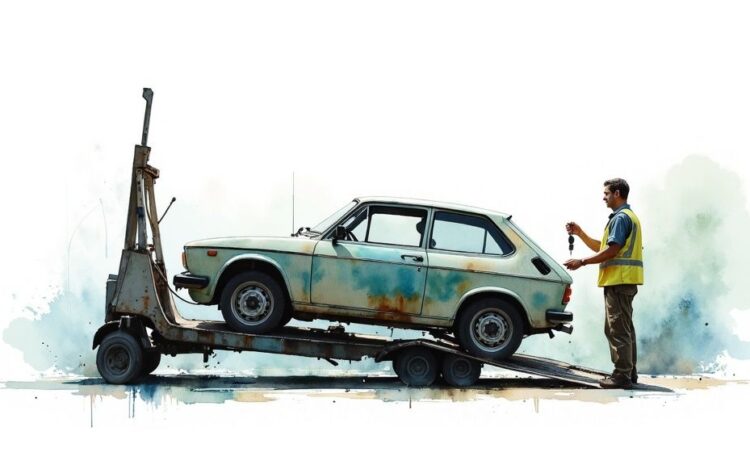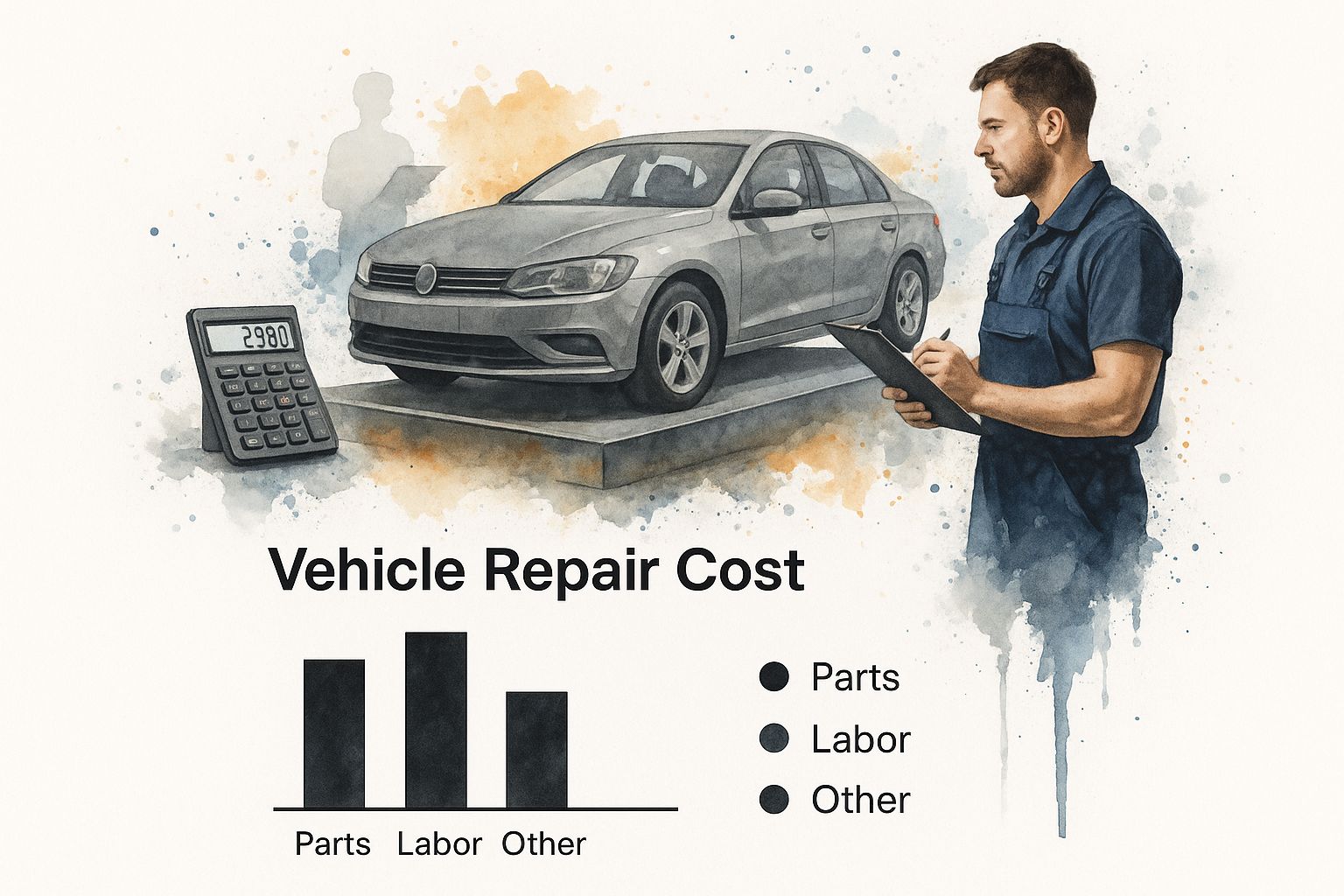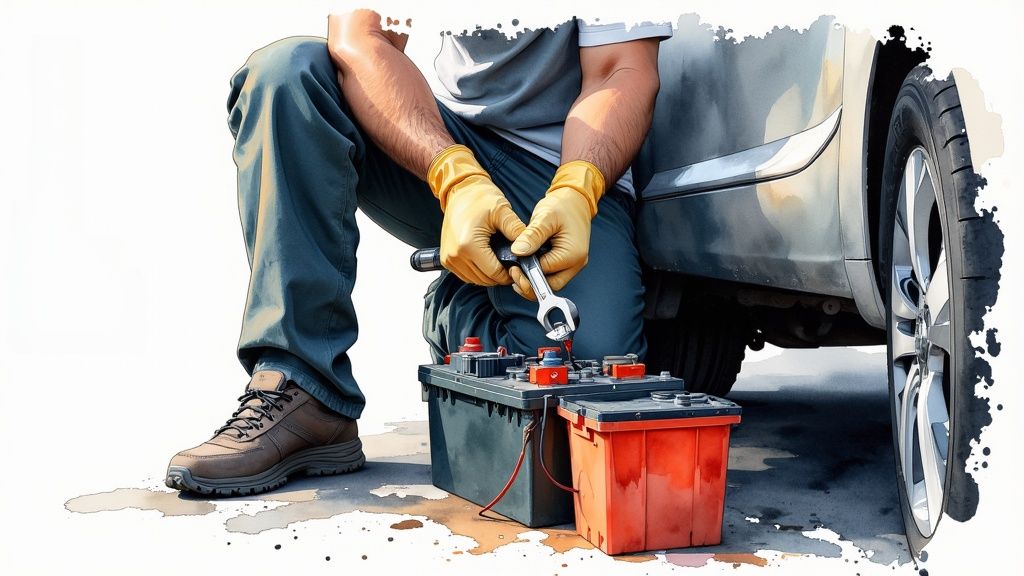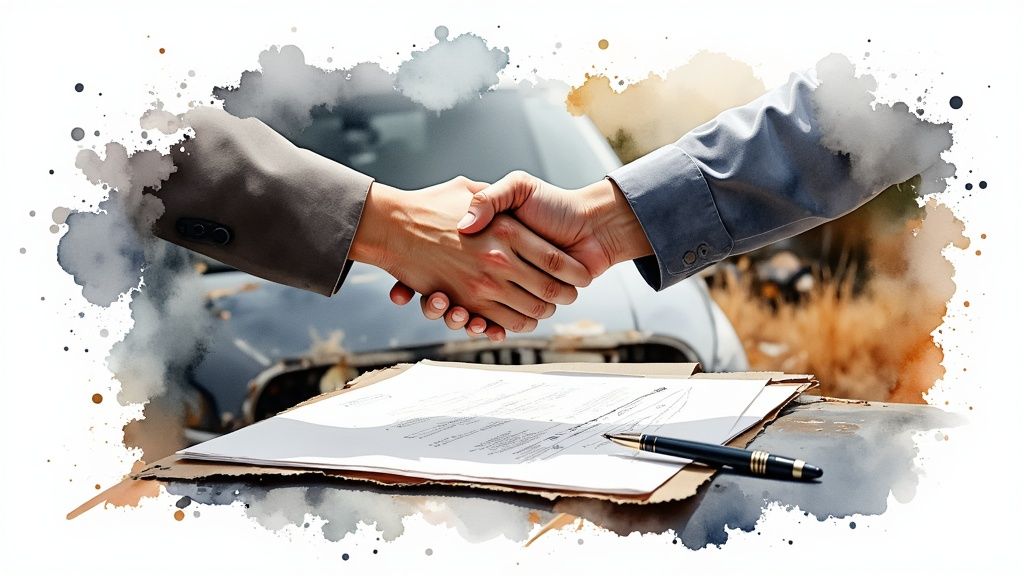
Scrap a Car Today: Get the Best Price Easily
Deciding when to scrap your car usually boils down to a single, nagging question: is it costing you more to keep it on the road than it's actually worth? When you're staring at a repair bill that eclipses the car's value, or an MOT failure feels like a final nail in the coffin, it’s a pretty clear sign. For most drivers, this is a practical and financially sensible turning point.
Is It Time to Scrap Your Car?
It can be incredibly frustrating to realise your trusty car has finally reached the end of its life, especially when it comes with an unexpected financial sting. Countless drivers across London and the home counties find themselves in this exact spot every year. It’s rarely one big breakdown; more often, it's a slow burn of accumulating problems that just makes driving it impractical.
Take a common scenario: a driver in Harrow has a ten-year-old hatchback and the engine completely gives out. The garage quotes a price for a replacement engine that's easily double what the car is worth. At that point, selling it privately is off the table. The most logical next step is to scrap the car and get some cash back for the metal.
Common Triggers for Scrapping a Vehicle
There are a few classic situations that tend to push car owners towards the scrapyard. Recognising them can help you see when you've hit that critical moment.
- Failed MOT and Eye-Watering Repair Costs: This is the big one. If your car fails its MOT on major components like a rotten chassis, a shot emissions system, or serious structural rust, you could be looking at bills running into the thousands.
- Non-Runner or Accident Damage: A car that won't start anymore due to a major mechanical failure, or one that's been officially written off after a crash, often has no other destination but the scrap heap.
- ULEZ Non-Compliance: This is a huge factor for anyone driving in or around London, Watford, or Slough. An older diesel or petrol car that doesn't meet the Ultra Low Emission Zone (ULEZ) standards suddenly becomes very expensive to use for daily trips.
- Just Plain Worn Out: Sometimes, a car simply gives up the ghost. Widespread rust, endless electrical gremlins, or a failing gearbox can make it unreliable, unsafe, and just not worth the hassle. A tradesperson in Iver with an old, knackered van might decide it’s far better to scrap it than to risk breaking down on the M25 again.
The decision to scrap a vehicle is becoming more and more common across the UK. It’s a pragmatic response to the financial and logistical headaches of keeping an older car running, particularly with ever-tighter environmental rules.
The UK's automotive recycling industry is busier than ever, which tells its own story. Over 1.2 million vehicles were officially scrapped in 2024, and that number is only expected to climb as policies continue to push us towards newer, cleaner cars.
This shows that scrapping your car isn't just a personal financial move; it's part of a much bigger national shift towards sustainability. If you want to dive deeper, you can find out more about UK scrap car trends on scraplocal.co.uk. Making this choice is a responsible step forward.
How to Get the Best Price for Your Scrap Car
When the time comes to finally part with your old car, your number one question is probably, "How much is it actually worth?" It's a common misconception that the value is just down to its weight in scrap metal. In reality, a whole host of factors come into play to determine the final price you'll be offered.
Getting a feel for these elements is the key to knowing whether you're getting a fair deal. Sure, a hefty transit van you've been running around Slough will naturally be worth more than a little hatchback from central London because there's simply more metal in it. But it's not always that straightforward. Sometimes, specific models have highly sought-after parts – a particular engine, gearbox, or catalytic converter – that can give the value a nice bump, even if the car itself is a complete non-runner.
Key Factors That Influence Your Scrap Value
So, what are scrap dealers really looking at when they give you a quote? It’s not a figure plucked from thin air. It’s a careful calculation based on a few key things.
This table breaks down the main components that determine the price you'll get for your end-of-life vehicle.
| Factor | Why It Matters | Tip to Maximise Value |
|---|---|---|
| Vehicle Weight and Size | This is the bedrock of any scrap valuation. More weight equals more recyclable steel, which forms the base price. | You can't change this, but know that larger vehicles like 4x4s or vans will always start at a higher base value. |
| Make, Model, and Age | Some cars are worth more in parts than others. A popular model might have components that are in high demand for repairs. | If you know your car has desirable parts (e.g., alloy wheels in good nick), mention them. It can sometimes influence the offer. |
| Condition of Salvageable Parts | Even if the car is scrap, a working engine, intact catalytic converter, or a clean interior can be stripped and sold on. | Don't remove valuable parts yourself unless you know what you're doing. Selling the car whole is often easier and safer. |
| Location | The cost of collecting your car is factored in. A vehicle in a remote spot might cost more to retrieve than one in a busy area like Harrow or Watford. | Choose a local or regional scrap service to minimise collection costs being passed on to you. |
Essentially, the final valuation is a blend of the car's raw material value, its potential for parts, and the logistics of collecting it.

Timing and Market Fluctuations
Here’s something many people don't realise: the price of scrap metal is constantly changing. It goes up and down with global supply and demand, a bit like the stock market. This means the quote you get in January could be quite different by March.
For instance, the UK scrap market is always on the move. We often see prices dip and recover over just a few months. This volatility highlights that timing can genuinely make a difference. Waiting too long not only means your car continues to lose value as it sits there, but you could also miss a peak in scrap metal prices.
Your location, say if you're in Iver, and the local demand for parts from your specific make and model can also create slight price variations from one area to another. It never hurts to get a couple of quotes to see what the going rate is where you are.
Getting the best price really boils down to having a bit of insight and not waiting forever to act. If you want to dig deeper, have a look at our comprehensive guide on how to scrap your car for the best value in 2023. It’ll arm you with all the knowledge you need to get a great offer when it’s time to say goodbye to your old vehicle.
Navigating the DVLA Paperwork Like a Pro
Let's be honest, dealing with official paperwork is rarely the fun part of any process. When it’s time to scrap your car, getting the DVLA side of things sorted is absolutely critical. It’s the final step that officially ends your legal responsibility for the vehicle, protecting you from any future fines.
It might sound a bit daunting, but it's actually quite simple once you know what's what. The main document you'll need is your V5C log book – think of it as the final handshake that transfers the car from your name to the scrap yard.
Getting the V5C Log Book Right
When our driver arrives to collect your car, whether you're in Harrow or Iver, you’ll need to have your V5C ready. The most important part is filling out the correct section to tell the DVLA you’ve transferred the vehicle to a motor trader. In this situation, the scrap yard is a licensed "Authorised Treatment Facility" or ATF.
Depending on how old your log book is, you'll be looking for one of two sections:
- For newer V5Cs (issued after April 2019): Fill out the green slip, which is Section 4.
- For older V5Cs: You’ll need the yellow slip, which is Section 9.
Just enter the details of the ATF collecting your car, sign and date the slip, and give that small section to the driver. You then need to post the main part of the V5C to the DVLA yourself. It’s a small task, but a vital one.
What if you can't find your V5C?
It happens, so don't panic. You can still scrap your car without it. You’ll just need to provide some photo ID for our records and then write to the DVLA directly. In your letter, you’ll need to inform them of the sale, providing the date and the full details of the ATF that took your vehicle.
The Certificate of Destruction: Your Proof of a Job Well Done
Once your car has been collected and processed at the ATF, you'll receive the final, crucial piece of paperwork: the Certificate of Destruction (CoD). This is an official DVLA document proving your vehicle has been legally and permanently destroyed. By law, the ATF must issue this certificate within seven days of scrapping your car.
This certificate is your ultimate safeguard. It’s the definitive proof that you are no longer the registered keeper and have no further responsibility for the car. Without a CoD, you could find yourself liable for road tax or even traffic offences if the vehicle somehow ended up back on the road illegally.
Any reputable service operating in areas like London, Watford, or Slough will provide a CoD without fail. It's the mark of a legitimate, trustworthy scrap car company.
If your car was declared off-road with a SORN, the Certificate of Destruction officially closes that loop with the DVLA. If you need a refresher on that, our guide explains how to SORN your vehicle properly. Getting the paperwork right gives you complete peace of mind, knowing everything has been handled correctly from start to finish.
Arranging a Smooth and Free Vehicle Collection
So, you've accepted a great offer for your old car. What's next? The final step is getting it collected, and I've got good news for you: with a professional service, this part is almost always completely free. You won't be hit with surprise towing fees or last-minute charges. It’s all part of the package.

Any reputable scrap dealer knows that your car might not be a runner. It could be stuck on your drive in London or parked up somewhere in Watford. That’s why they come prepared with the right gear, like flatbed trucks, to handle any car, in any condition, safely and without any fuss.
The whole point is to make this easy for you. You’ll get to schedule a collection time that actually works with your life, whether that’s a weekday morning before the school run or a Saturday afternoon.
Getting Ready for Collection Day
To make sure the handover goes off without a hitch, a little bit of prep work on your end can make all the difference. Before the driver turns up, it’s worth spending a few minutes having a final clear-out of the car. We're not talking about getting the hoover out, but making sure you've removed all your personal bits and bobs.
I always tell people to check these common hiding spots:
- Glove Compartment & Centre Console: This is a classic spot for old receipts, service history, and even forgotten sunglasses.
- Under the Seats & in the Boot: You’d be amazed what can roll under a seat over the years. Have a good rummage around.
- CD Player & Sun Visors: Don’t forget to eject that old mixtape! Also, check the visor pockets for any stray cards or papers.
- Exterior Bits: If you’re keeping your private number plate, make sure it’s removed. The same goes for any resident parking permits you might need to transfer.
A quick five-minute check can save you a real headache later. Trust me, once your car is on its way to the recycling facility, getting back that forgotten phone charger or important document is next to impossible.
What Happens on the Day
When collection day arrives, the process is surprisingly quick. A driver from the Authorised Treatment Facility (ATF) will arrive at the agreed time, whether you're in Slough, Harrow, or Iver.
First, they’ll just confirm the car is the one they're expecting. You’ll need to have your V5C log book and some photo ID (like your driving licence) ready. The driver will guide you through filling out the necessary section of the V5C, which officially transfers the car to them.
Once the paperwork is sorted, they’ll professionally load your car onto their recovery vehicle. The whole on-site process usually takes no more than 15-20 minutes. You'll get your payment sorted via an instant bank transfer right there on the spot, and then they're off. You're left with a clear driveway and the money in your account. Simple as that.
So, your old car has been picked up from your drive in London or Slough. What happens next? It’s a common question, and the answer is far more interesting than just a giant car-crushing machine. Your vehicle is actually starting a highly regulated and sophisticated journey at a government-approved scrapyard, officially known as an Authorised Treatment Facility (ATF). This is where the real magic of recycling begins.
The very first stop inside the ATF is the de-pollution bay. This is probably the most critical part of the entire process. Before anything else can happen, every single hazardous material has to be meticulously drained and removed to make sure nothing nasty seeps into the environment. It's like a pre-op before the main surgery.
Here’s a quick rundown of what gets taken out:
- All the fluids: We’re talking engine oil, coolant, brake fluid, and whatever petrol or diesel is left in the tank.
- Nasty gases: The air conditioning system is safely degassed to capture and contain those harmful refrigerants.
- The dangerous bits: The battery, full of lead and acid, is one of the first things to go, along with any older components like mercury-containing switches.
Dismantling for a New Life
With the car now completely clean and safe, it’s moved over to the dismantling area. This is where technicians with a keen eye get to work, stripping the vehicle of any parts that can be salvaged and reused. Good quality alternators, starter motors, and sometimes even whole engines or gearboxes are carefully recovered. Even body panels, wing mirrors, and alloy wheels are taken off if they’re still in decent nick.
This "spare parts" approach ensures that as much of your car as possible gets a second chance on the road, which is a massive win for the circular economy. Every reused part is one less new part that needs to be manufactured. If you're curious about how this fits into bigger government-led initiatives, our guide on how car scrappage schemes work is a great place to learn more.
Just remember, every car properly scrapped at an ATF, whether it's coming from Harrow or Iver, is a direct contribution to the UK's impressive recycling targets. It’s a small personal act that has a genuinely significant positive impact.
The UK has come a long way in this field. Thanks to tight environmental regulations and the hard work of the industry, the recycling rate for scrap cars is higher than ever. In fact, the total reuse and recovery rate for vehicles hit 94.1% as of 2025, which comfortably sails past the EU's targets. It’s solid proof of the UK's commitment to doing this right. You can dive deeper into the numbers by checking out the 2025 scrap car recycling statistics on scraplocal.co.uk.
Once everything of value has been stripped away, the leftover shell finally meets the shredder. This colossal machine smashes the metal frame into small, fist-sized chunks. These pieces are then passed through a series of powerful magnets and advanced sensors that separate the steel, aluminium, plastics, and other materials. From there, each material is bundled up and sent off to be melted down, ready to be reborn as something entirely new.
Common Questions About Scrapping a Car

When you decide it’s time to scrap a car, a few questions almost always pop up. It's not something people do every day, so having some uncertainties is completely normal. We hear the same queries from customers all across London and the home counties, so let’s get the most common ones cleared up.
Having the right information makes the whole experience much smoother. It gives you the confidence that you’re handling everything correctly, from the paperwork to the final payment.
What Should I Do If I Cannot Find My V5C Log Book?
Don't panic – this happens all the time. You can absolutely still scrap your car without the V5C log book. The process just has one small extra step, but it's still very straightforward.
When our driver arrives, they'll just need to see some photo ID (like your driving licence) and a recent utility bill to confirm your address. This is simply to verify that you’re the legal owner. After that, you'll need to write to the DVLA yourself to let them know you've sold the vehicle to an Authorised Treatment Facility (ATF). Make sure you include the ATF's name and address, your car's registration, and the exact date of the sale.
Can I Get Paid in Cash When I Scrap My Car?
This is a big one: no, you can't be paid in cash. It's a crucial point that protects both you and the scrap dealer. The Scrap Metal Dealers Act 2013 made it illegal for anyone to pay cash for scrap metal, a law brought in to clamp down on metal theft.
Any reputable and licensed ATF will pay you by a secure bank transfer or a cheque. If a company ever offers you cash for your scrap car, it’s a major red flag that they aren't operating legally. Always, always insist on a traceable payment.
How Long Does It Take to Get a Certificate of Destruction?
The Certificate of Destruction (CoD) is your official proof that the car is off the road for good and that your responsibility for it has ended. The ATF that handles your vehicle is legally required to issue this document within 7 days of scrapping it.
They’ll usually send it to you by email or post. This piece of paper is vital because it officially severs your legal ties to the vehicle, protecting you from any future road tax bills or fines. It’s definitely one to keep safe for your records.
Do I Need to Tell My Insurer After Scrapping My Car?
Yes, this is an essential final step you don't want to forget. As soon as you have your Certificate of Destruction in hand, get on the phone with your insurance provider to cancel your policy. If you don't, you'll carry on paying for a car you no longer own.
Remember to act on this promptly. Depending on your policy terms and how far into the year you are, you might even be eligible for a refund on the remaining portion of your insurance cover.
Making this final call ensures every last legal tie to the vehicle is cut, giving you complete peace of mind. Getting these details right guarantees a smooth process, whether you’re in Watford, Slough, or Harrow.
Ready to scrap your car with a team you can trust? At Fast Scrap Car, we make the entire process simple, transparent, and rewarding. Get your instant quote and arrange a free, same-day collection across London and Surrey today. Visit us at https://fastscrapcar.co.uk to get started.
